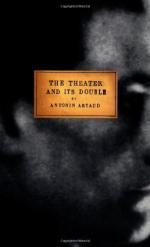
|
| Name: _________________________ | Period: ___________________ |
This test consists of 15 multiple choice questions and 5 short answer questions.
Multiple Choice Questions
1. Artaud suggests that in order to take language to a metaphysical level, it must be reduced to what?
(a) Poetry.
(b) Speaking quietly.
(c) Incantation.
(d) Singing.
2. Alchemy uses what to reflect physical operations at a spiritual level?
(a) Gold.
(b) Magic.
(c) Symbols.
(d) Chemicals.
3. What does Artaud say serves as a copy, or double, of a life that does not exist?
(a) Art.
(b) Alchemy.
(c) Poetry.
(d) Theater.
4. In the Balinese theater, Artaud writes "The drama does not develop as a conflict of feelings but as a conflict of" what?
(a) Gutteral reactions.
(b) Psychological responses.
(c) God-like entities.
(d) Spiritual states.
5. In what year was the original Le Theatre et son Double published?
(a) 1920.
(b) 1938.
(c) 1945.
(d) 1919.
6. Of the performers of the Balinese theater, Artaud writes, "They are like huge _____ full of lines and segments drawn to connect them with an unknown natural perspective of which they seem nothing more than a, kind of detached geometry."
(a) Insects.
(b) Gods.
(c) Men.
(d) Monsters.
7. Artaud asserts that in the Occidental version of theater, _____ are everything.
(a) Gestures.
(b) Sounds.
(c) Costumes.
(d) Words.
8. In the Preface, Artaud writes, "If confusion is the sign of the times, I see at the root of this confusion a rupture between things and ____".
(a) Life.
(b) Beauty.
(c) Love.
(d) Words.
9. Who is the painter whom Artaud writes of in "Metaphysics and the Mise en Scene"?
(a) Pablo Picasso.
(b) Andres Michaeleas.
(c) Lucas van den Leyden.
(d) Hans Vernswarth.
10. In Artaud's metaphor for the plague, where did the ship end up docking?
(a) Marseilles.
(b) Rome.
(c) Paris.
(d) Sicily.
11. Artaud writes, "it is the _______ that is the theater much more than the written and spoken play."
(a) Mise en scene.
(b) Director.
(c) Performance.
(d) Actor.
12. What is proposed by the author as meant to shake up the foundations of civilization and culture as a whole?
(a) Theater of shadows.
(b) Theater of cruelty.
(c) Theater of meaning.
(d) Theater of gesture.
13. In Balinese theater, voice and speech are given an entirely new role, in part because the power of the director, or __________ of a play is absolute.
(a) Raison d'etre.
(b) Dictator.
(c) Mais de scene.
(d) Metteur en scène.
14. Artaud writes in the Preface that "A civilized man judges and is judged according to his" what?
(a) Poetry.
(b) Behavior.
(c) Letters.
(d) Thoughts.
15. This is a perversion of theater to represent psychological and social conflicts and daily life, simply because the object of theater is not psychological but rather plastic and essentially what?
(a) Material.
(b) Spiritual.
(c) Transcendental.
(d) Ungodly.
Short Answer Questions
1. What is the mise en scene composed of?
2. Which form of the theater does Artaud admire in contrast to Occidental forms?
3. What, along with theater scripted in words, must disappear because it loses its value as soon as it is repeated?
4. In what town does Artaud tell the story of the plague being foreseen by the viceroy?
5. The "gold" of the theater evokes in the spirit what, according to Artaud?
|
This section contains 477 words (approx. 2 pages at 300 words per page) |

|




